- Home
- H. P. Lovecraft
Shadows of Death Page 9
Shadows of Death Read online
Page 9
Secrets of the primal planet and its immemorial aeons flashed through my brain without the aid of sight or sound, and there were known to me things which not even the wildest of former dreams had ever suggested. And all the while cold fingers of damp vapor clutched and picked at me, and that eldritch, damnable whistling shrieked fiendishly above all the alternations of babel and silence in the whirlpools of darkness around.
Afterward there were visions of the cyclopean city of my dreams—not in ruins, but just as I had dreamed of it. I was in my conical, nonhuman body again, and mingled with crowds of the Great Race and the captive minds who carried books up and down the lofty corridors and vast inclines.
Then, superimposed upon these pictures, were frightful, momentary flashes of a nonvisual consciousness involving desperate struggles, a writhing free from clutching tentacles of whistling wind, an insane, batlike flight through half-solid air, a feverish burrowing through the cyclone-whipped dark, and a wild stumbling and scrambling over fallen masonry.
Once there was a curious, intrusive flash of half sight—a faint, diffuse suspicion of bluish radiance far over head. Then there came a dream of wind-pursued climbing and crawling—of wriggling into a blaze of sardonic moonlight through a jumble of debris which slid and collapsed after me amidst a morbid hurricane. It was the evil, monotonous beating of that maddening moonlight which at last told me of the return of what I had once known as the objective, waking world.
I was clawing prone through the sands of the Australian desert, and around me shrieked such a tumult of wind as I had never before known on our planet’s surface. My clothing was in rags, and my whole body was a mass of bruises and scratches.
Full consciousness returned very slowly, and at no time could I tell just where delirious dream left off and true memory began. There had seemed to be a mound of titan blocks, an abyss beneath it, a monstrous revelation from the past, and a nightmare horror at the end—but how much of this was real?
My flashlight was gone, and likewise my metal case I may have discovered. Had there been such a case—or any abyss—or any mound? Raising my head, I looked behind me, and saw only the sterile, undulant sands of the desert.
The demon wind died down, and the bloated, fungoid moon sank reddeningly in the west. I lurched to my feet and began to stagger southwestward toward the camp. What in truth had happened to me? Had I merely collapsed in the desert and dragged a dream-racked body over miles of sand and buried blocks? If not, how could I bear to live any longer?
For, in this new doubt, all my faith in the myth-born unreality of my visions dissolved once more into the hellish older doubting. If that abyss was real, then the Great Race was real—and its blasphemous reachings and seizures in the cosmos-wide vortex of time were no myths or nightmares, but a terrible, soul-shattering actuality.
Had I, in full, hideous fact, been drawn back to a prehuman world of a hundred and fifty million years ago in those dark, baffling days of the amnesia? Had my present body been the vehicle of a frightful alien consciousness from paleogean gulfs of time?
Had I, as the captive mind of those shambling horrors, indeed known that accursed city of stone in its primordial heyday, and wriggled down those familiar corridors in the loathsome shape of my captor? Were those tormenting dreams of more than twenty years the offspring of stark, monstrous memories?
Had I once veritably talked with minds from reachless corners of time and space, learned the universe’s secrets, past and to come, and written the annals of my own world for the metal cases of those titan archives? And were those others—those shocking elder things of the mad winds and demon pipings—in truth a lingering, lurking menace, waiting and slowly weakening in black abysses while varied shapes of life drag out their multimillennial courses on the planet’s age-racked surface?
I do not know. If that abyss and what it held were real, there is no hope. Then, all too truly, there lies upon this world of man a mocking and incredible shadow out of time. But, mercifully there is no proof that these things are other than fresh phases of my myth-born dreams. I did not bring back the metal case that would have been a proof, and so far those subterrene corridors have not been found.
If the laws of the universe are kind, they will never be found. But I must tell my son what I saw or thought I saw, and let him use his judgment as a psychologist in gauging the reality of my experience, and communicating this account to others.
I have said that the awful truth behind my tortured years of dreaming hinges absolutely upon the actuality of what I thought I saw in those cyclopean, buried ruins. It has been hard for me, literally, to set down that crucial revelation, though no reader can have failed to guess it. Of course, it lay in that book within the metal case—the case which I pried out of its lair amidst the dust of a million centuries.
No eye had seen, no hand had touched that book since the advent of man to this planet. And yet, when I flashed my torch upon it in that frightful abyss, I saw that the queerly pigmented letters on the brittle, aeon-browned cellulose pages were not indeed any nameless hieroglyphs of earth’s youth. They were, instead, the letters of our familiar alphabet, spelling out the words of the English language in my own handwriting.
The Festival
Efficiut Daemones, ut quae non sunt, sic tamen quasi sint, conspicienda hominibus exhibeant.
—LACTANTIUS
I WAS FAR from home, and the spell of the eastern sea was upon me. In the twilight I heard it pounding on the rocks, and I knew it lay just over the hill where the twisting willows writhed against the clearing sky and the first stars of evening. And because my fathers had called me to the old town beyond, I pushed on through the shallow, new-fallen snow along the road that soared lonely up to where Aldebaran twinkled among the trees; on toward the very ancient town I had never seen but often dreamed of.
It was the Yuletide, that men call Christmas though they know in their hearts it is older than Bethlehem and Babylon, older than Memphis and mankind. It was the Yuletide, and I had come at last to the ancient sea town where my people had dwelt and kept festival in the elder time when festival was forbidden; where also they had commanded their sons to keep festival once every century, that the memory of primal secrets might not be forgotten. Mine were an old people, and were old even when this land was settled three hundred years before. And they were strange, because they had come as dark furtive folk from opiate southern gardens of orchids, and spoken another tongue before they learnt the tongue of the blue-eyed fishers. And now they were scattered, and shared only the rituals of mysteries that none living could understand. I was the only one who came back that night to the old fishing town as legend bade, for only the poor and the lonely remember.
Then beyond the hill’s crest I saw Kingsport outspread frostily in the gloaming; snowy Kingsport with its ancient vanes and steeples, ridgepoles and chimney-pots, wharves and small bridges, willow-trees and graveyards; endless labyrinths of steep, narrow, crooked streets, and dizzy church-crowned central peak that time durst not touch; ceaseless mazes of colonial houses piled and scattered at all angles and levels like a child’s disordered blocks; antiquity hovering on grey wings over winter-whitened gables and gambrel roofs; fanlights and small-paned windows one by one gleaming out in the cold dusk to join Orion and the archaic stars. And against the rotting wharves the sea pounded; the secretive, immemorial sea out of which the people had come in the elder time.
Beside the road at its crest a still higher summit rose, bleak and windswept, and I saw that it was a burying-ground where black gravestones stuck ghoulishly through the snow like the decayed fingernails of a gigantic corpse. The printless road was very lonely, and sometimes I thought I heard a distant horrible creaking as of a gibbet in the wind. They had hanged four kinsmen of mine for witchcraft in 1692, but I did not know just where.
As the road wound down the seaward slope I listened for the merry sounds of a village at evening, but did not hear them. Then I thought of the season, and felt that these old Puritan f
olk might well have Christmas customs strange to me, and full of silent hearthside prayer. So after that I did not listen for merriment or look for wayfarers, kept on down past the hushed lighted farmhouses and shadowy stone walls to where the signs of ancient shops and sea taverns creaked in the salt breeze, and the grotesque knockers of pillared doorways glistened along deserted unpaved lanes in the light of little, curtained windows.
I had seen maps of the town, and knew where to find the home of my people. It was told that I should be known and welcomed, for village legend lives long; so I hastened through Back Street to Circle Court, and across the fresh snow on the one full flagstone pavement in the town, to where Green Lane leads off behind the Market House. The old maps still held good, and I had no trouble; though at Arkham they must have lied when they said the trolleys ran to this place, since I saw not a wire overhead. Snow would have hid the rails in any case. I was glad I had chosen to walk, for the white village had seemed very beautiful from the hill; and now I was eager to knock at the door of my people, the seventh house on the left in Green Lane, with an ancient peaked roof and jutting second story, all built before 1650.
There were lights inside the house when I came upon it, and I saw from the diamond window-panes that it must have been kept very close to its antique state. The upper part overhung the narrow grass-grown street and nearly met the over-hanging part of the house opposite, so that I was almost in a tunnel, with the low stone doorstep wholly free from snow. There was no sidewalk, but many houses had high doors reached by double flights of steps with iron railings. It was an odd scene, and because I was strange to New England I had never known its like before. Though it pleased me, I would have relished it better if there had been footprints in the snow, and people in the streets, and a few windows without drawn curtains.
When I sounded the archaic iron knocker I was half afraid. Some fear had been gathering in me, perhaps because of the strangeness of my heritage, and the bleakness of the evening, and the queerness of the silence in that aged town of curious customs. And when my knock was answered I was fully afraid, because I had not heard any footsteps before the door creaked open. But I was not afraid long, for the gowned, slippered old man in the doorway had a bland face that reassured me; and though he made signs that he was dumb, he wrote a quaint and ancient welcome with the stylus and wax tablet he carried.
He beckoned me into a low, candle-lit room with massive exposed rafters and dark, stiff, sparse furniture of the seventeenth century. The past was vivid there, for not an attribute was missing. There was a cavernous fireplace and a spinning-wheel at which a bent old woman in loose wrapper and deep poke-bonnet sat back toward me, silently spinning despite the festive season. An indefinite dampness seemed upon the place, and I marvelled that no fire should be blazing. The highbacked settle faced the row of curtained windows at the left, and seemed to be occupied, though I was not sure. I did not like everything about what I saw, and felt again the fear I had had. This fear grew stronger from what had before lessened it, for the more I looked at the old man’s bland face the more its very blandness terrified me. The eyes never moved and the skin was too much like wax. Finally I was sure it was not a face at all, but a fiendishly cunning mask. But the flabby hands, curiously gloved, wrote genially on the tablet and told me I must wait a while before I could be led to the place of the festival.
Pointing to a chair, table, and pile of books, the old man now left the room; and when I sat down to read I saw that the books were hoary and mouldy, and that they included old Morryster’s wild Marvells of Science, the terrible Saducismus Triumphatus of Joseph Glanvil, published in 1681, the shocking Daemonolatreia of Remigius, printed in 1595 at Lyons, and worst of all, the unmentionable Necronomicon of the mad Arab Abdul Alhazred, in Olaus Wormius’ forbidden Latin translation; a book which I had never seen, but of which I had heard monstrous things whispered. No one spoke to me, but I could hear the creaking of signs in the wind outside, and the whir of the wheel as the bonneted old woman continued her silent spinning, spinning. I thought the room and the books and the people very morbid and disquieting, but because an old tradition of my fathers had summoned me to strange feastings, I resolved to expect queer things. So I tried to read, and soon became tremblingly absorbed by something I found in that accursed Necronomicon; a thought and a legend too hideous for sanity or consciousness, but I disliked it when I fancied I heard the closing of one of the windows that the settle faced, as if it had been stealthily opened. It had seemed to follow a whirring that was not of the old woman’s spinning-wheel. This was not much, though, for the old woman was spinning very hard, and the aged clock had been striking. After that I lost the feeling that there were persons on the settle, and was reading intently and shudderingly when the old man came back booted and dressed in a loose antique costume, and sat down on that very bench, so that I could not see him. It was certainly nervous waiting, and the blasphemous book in my hands made it doubly so. When eleven struck, however, the old man stood up, glided to a massive carved chest in a corner, and got two hooded cloaks; one of which he donned, and the other of which he draped round the old woman, who was ceasing her monotonous spinning. Then they both started for the outer door; the woman lamely creeping, and the old man, after picking up the very book I had been reading, beckoning me as he drew his hood over that unmoving face or mask.
We went out into the moonless and tortuous network of that incredibly ancient town; went out as the lights in the curtained windows disappeared one by one, and the Dog Star leered at the throng of cowled, cloaked figures that poured silently from every doorway and formed monstrous processions up this street and that, past the creaking signs and antediluvian gables, the thatched roofs and diamond-paned windows; threading precipitous lanes where decaying houses overlapped and crumbled together, gliding across open courts and churchyards where the bobbing lanthorns made eldritch drunken constellations.
Amid these hushed throngs I followed my voiceless guides; jostled by elbows that seemed preternaturally soft, and pressed by chests and stomachs that seemed abnormally pulpy; but seeing never a face and hearing never a word. Up, up, up, the eery columns slithered, and I saw that all the travellers were converging as they flowed near a sort of focus of crazy alleys at the top of a high hill in the centre of the town, where perched a great white church. I had seen it from the road’s crest when I looked at Kingsport in the new dusk, and it had made me shiver because Aldebaran had seemed to balance itself a moment on the ghostly spire.
There was an open space around the church; partly a churchyard with spectral shafts, and partly a half-paved square swept nearly bare of snow by the wind, and lined with unwholesomely archaic houses having peaked roofs and overhanging gables. Death-fires danced over the tombs, revealing gruesome vistas, though queerly failing to cast any shadows. Past the churchyard, where there were no houses, I could see over the hill’s summit and watch the glimmer of stars on the harbour, though the town was invisible in the dark. Only once in a while a lanthorn bobbed horribly through serpentine alleys on its way to overtake the throng that was now slipping speechlessly into the church. I waited till the crowd had oozed into the black doorway, and till all the stragglers had followed. The old man was pulling at my sleeve, but I was determined to be the last. Crossing the threshold into the swarming temple of unknown darkness, I turned once to look at the outside world as the churchyard phosphorescence cast a sickly glow on the hilltop pavement. And as I did so I shuddered. For though the wind had not left much snow, a few patches did remain on the path near the door; and in that fleeting backward look it seemed to my troubled eyes that they bore no mark of passing feet, not even mine.
The church was scarce lighted by all the lanthorns that had entered it, for most of the throng had already vanished. They had streamed up the aisle between the high pews to the trap-door of the vaults which yawned loathsomely open just before the pulpit, and were now squirming noiselessly in. I followed dumbly down the footworn steps and into the dark, suffoc
ating crypt. The tail of that sinuous line of night-marchers seemed very horrible, and as I saw them wriggling into a venerable tomb they seemed more horrible still. Then I noticed that the tomb’s floor had an aperture down which the throng was sliding, and in a moment we were all descending an ominous staircase of rough-hewn stone; a narrow spiral staircase damp and peculiarly odorous, that wound endlessly down into the bowels of the hill past monotonous walls of dripping stone blocks and crumbling mortar. It was a silent, shocking descent, and I observed after a horrible interval that the walls and steps were changing in nature, as if chiselled out of the solid rock. What mainly troubled me was that the myriad footfalls made no sound and set up no echoes. After more aeons of descent I saw some side passages or burrows leading from unknown recesses of blackness to this shaft of nighted mystery. Soon they became excessively numerous, like impious catacombs of nameless menace; and their pungent odour of decay grew quite unbearable. I knew we must have passed down through the mountain and beneath the earth of Kingsport itself, and I shivered that a town should be so aged and maggoty with subterraneous evil.
Then I saw the lurid shimmering of pale light, and heard the insidious lapping of sunless waters. Again I shivered, for I did not like the things that the night had brought, and wished bitterly that no forefather had summoned me to this primal rite. As the steps and the passage grew broader, I heard another sound, the thin, whining mockery of a feeble flute; and suddenly there spread out before me the boundless vista of an inner world—a vast fungous shore litten by a belching column of sick greenish flame and washed by a wide oily river that flowed from abysses frightful and unsuspected to join the blackest gulfs of immemorial ocean.
Fainting and gasping, I looked at that unhallowed Erebus of titan toadstools, leprous fire and slimy water; and saw the cloaked throngs forming a semicircle around the blazing pillar. It was the Yule-rite, older than man and fated to survive him; the primal rite of the solstice and of spring’s promise beyond the snows; the rite of fire and evergreen, light and music. And in the stygian grotto I saw them do the rite, and adore the sick pillar of flame, and throw into the water handfuls gouged out of the viscous vegetation which glittered green in the chlorotic glare. I saw this, and I saw something amorphously squatted far away from the light, piping noisomely on a flute; and as the thing piped I thought I heard noxious muffled flutterings in the foetid darkness where I could not see. But what frightened me most was that flaming column; spouting volcanically from depths profound and inconceivable, casting no shadows as healthy flame should, and coating the nitrous stone with a nasty, venomous verdigris. For in all that seething combustion no warmth lay, but only the clamminess of death and corruption.

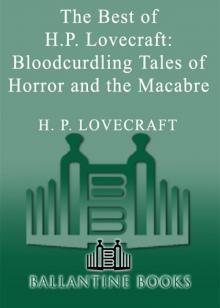 The Best of H.P. Lovecraft
The Best of H.P. Lovecraft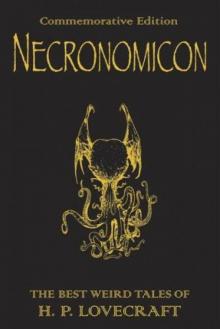 The Definitive H.P. Lovecraft: 67 Tales Of Horror In One Volume
The Definitive H.P. Lovecraft: 67 Tales Of Horror In One Volume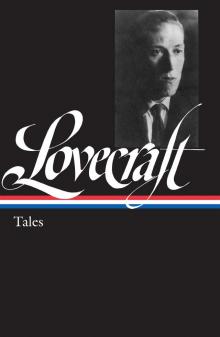 The Complete Works of H.P. Lovecraft
The Complete Works of H.P. Lovecraft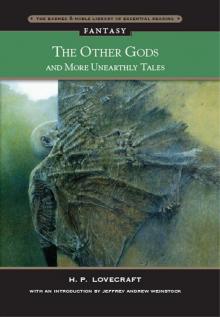 Other Gods and More Unearthly Tales
Other Gods and More Unearthly Tales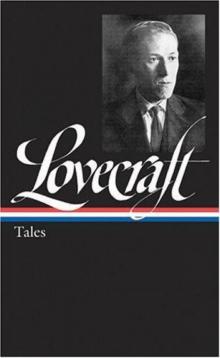 Lovecraft's Fiction Volume I, 1905-1925
Lovecraft's Fiction Volume I, 1905-1925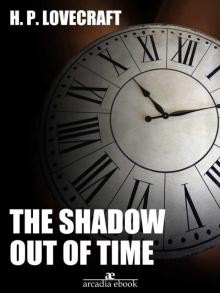 The Shadow Out of Time
The Shadow Out of Time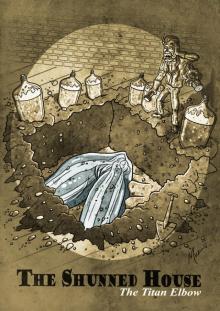 The Shunned House
The Shunned House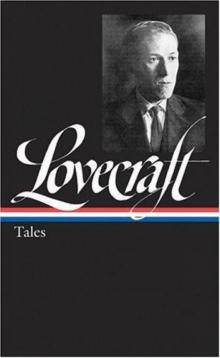 Lovecraft's Fiction Volume II, 1926-1928
Lovecraft's Fiction Volume II, 1926-1928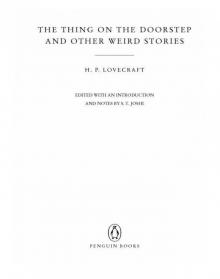 The Thing on the Doorstep and Other Weird Stories
The Thing on the Doorstep and Other Weird Stories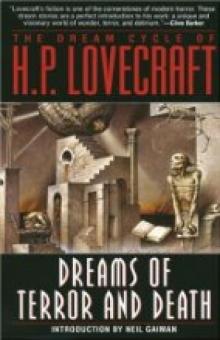 Dream Cycle of H. P. Lovecraft: Dreams of Terror and Death
Dream Cycle of H. P. Lovecraft: Dreams of Terror and Death Great Tales of Horror
Great Tales of Horror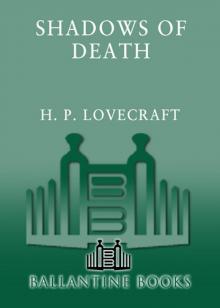 Shadows of Death
Shadows of Death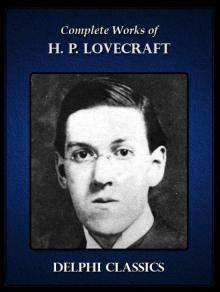 Delphi Complete Works of H. P. Lovecraft (Illustrated)
Delphi Complete Works of H. P. Lovecraft (Illustrated)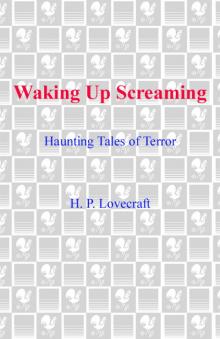 Waking Up Screaming: Haunting Tales of Terror
Waking Up Screaming: Haunting Tales of Terror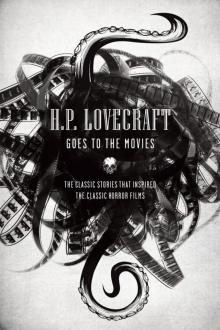 H.P. Lovecraft Goes to the Movies
H.P. Lovecraft Goes to the Movies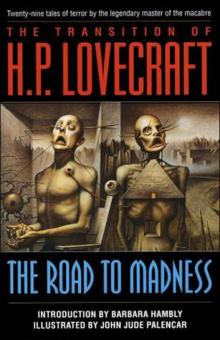 The Road to Madness
The Road to Madness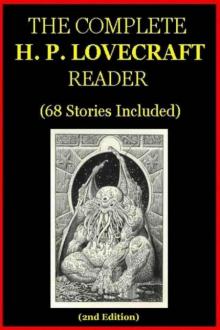 The Complete H.P. Lovecraft Reader (68 Stories)
The Complete H.P. Lovecraft Reader (68 Stories)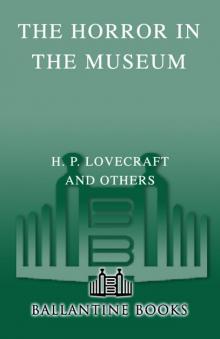 The Horror in the Museum
The Horror in the Museum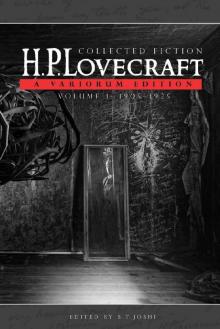 Collected Fiction Volume 1 (1905-1925): A Variorum Edition
Collected Fiction Volume 1 (1905-1925): A Variorum Edition Lovecrafts_Fiction, vol.I_1905-1925
Lovecrafts_Fiction, vol.I_1905-1925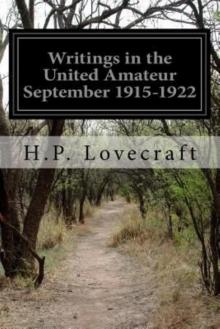 Writings in the United Amateur, 1915-1922
Writings in the United Amateur, 1915-1922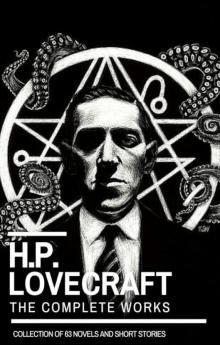 H.P. Lovecraft: The Complete Works
H.P. Lovecraft: The Complete Works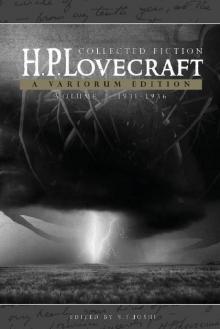 Collected Fiction Volume 3 (1931-1936): A Variorum Edition
Collected Fiction Volume 3 (1931-1936): A Variorum Edition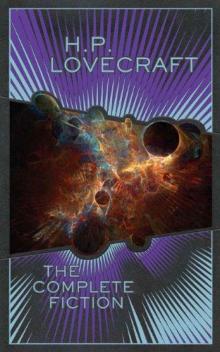 H.P. Lovecraft: The Complete Fiction
H.P. Lovecraft: The Complete Fiction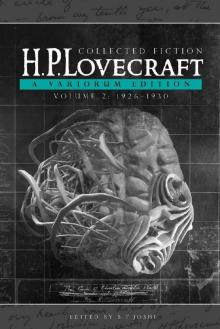 Collected Fiction Volume 2 (1926-1930): A Variorum Edition
Collected Fiction Volume 2 (1926-1930): A Variorum Edition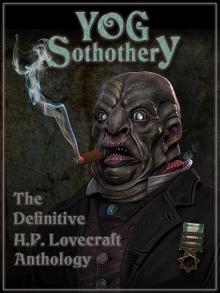 Yog Sothothery - The Definitive H.P. Lovecraft Anthology
Yog Sothothery - The Definitive H.P. Lovecraft Anthology The Complete H.P. Lovecraft Collection (Xist Classics)
The Complete H.P. Lovecraft Collection (Xist Classics)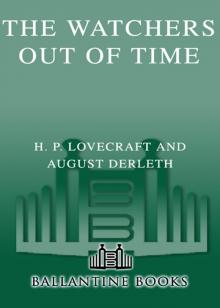 The Watchers Out of Time
The Watchers Out of Time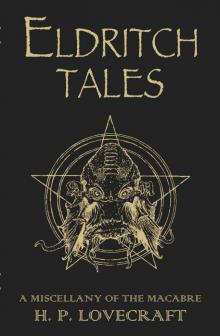 Eldritch Tales
Eldritch Tales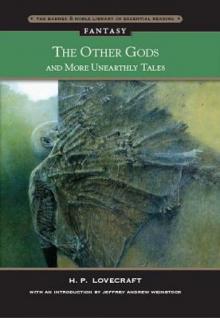 The Other Gods And More Unearthly Tales
The Other Gods And More Unearthly Tales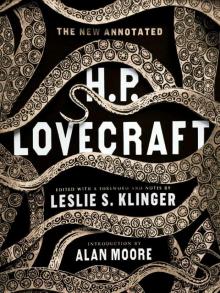 The New Annotated H. P. Lovecraft
The New Annotated H. P. Lovecraft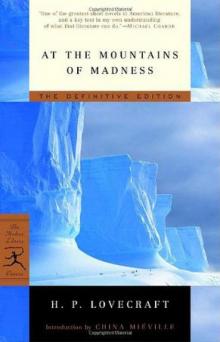 At the mountains of madness
At the mountains of madness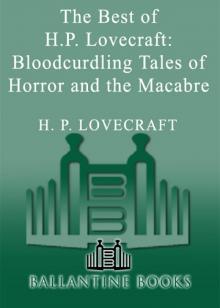 Bloodcurdling Tales of Horror and the Macabre
Bloodcurdling Tales of Horror and the Macabre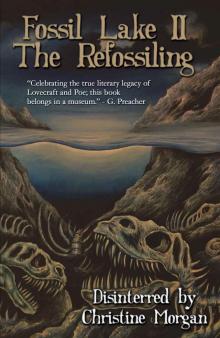 Fossil Lake II: The Refossiling
Fossil Lake II: The Refossiling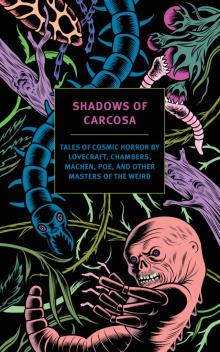 Shadows of Carcosa: Tales of Cosmic Horror by Lovecraft, Chambers, Machen, Poe, and Other Masters of the Weird
Shadows of Carcosa: Tales of Cosmic Horror by Lovecraft, Chambers, Machen, Poe, and Other Masters of the Weird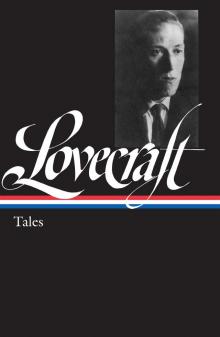 H. P. Lovecraft
H. P. Lovecraft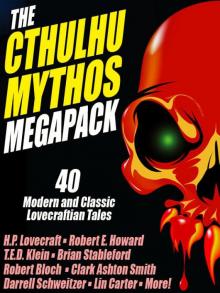 The Cthulhu Mythos Megapack
The Cthulhu Mythos Megapack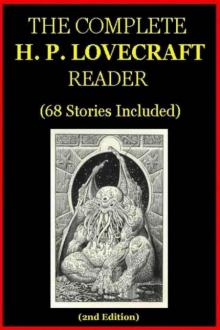 The Complete H. P. Lovecraft Reader (2nd Edition)
The Complete H. P. Lovecraft Reader (2nd Edition)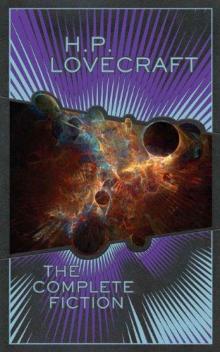 The Complete Fiction
The Complete Fiction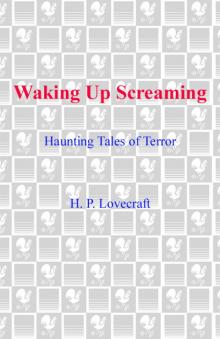 Waking Up Screaming
Waking Up Screaming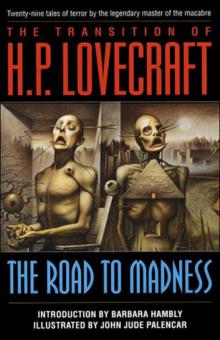 Transition of H. P. Lovecraft
Transition of H. P. Lovecraft![[1935] The Shadow Out of Time Read online](http://i1.bookreadfree.com/i2/04/12/1935_the_shadow_out_of_time_preview.jpg) [1935] The Shadow Out of Time
[1935] The Shadow Out of Time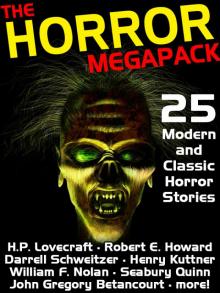 The Horror Megapack
The Horror Megapack